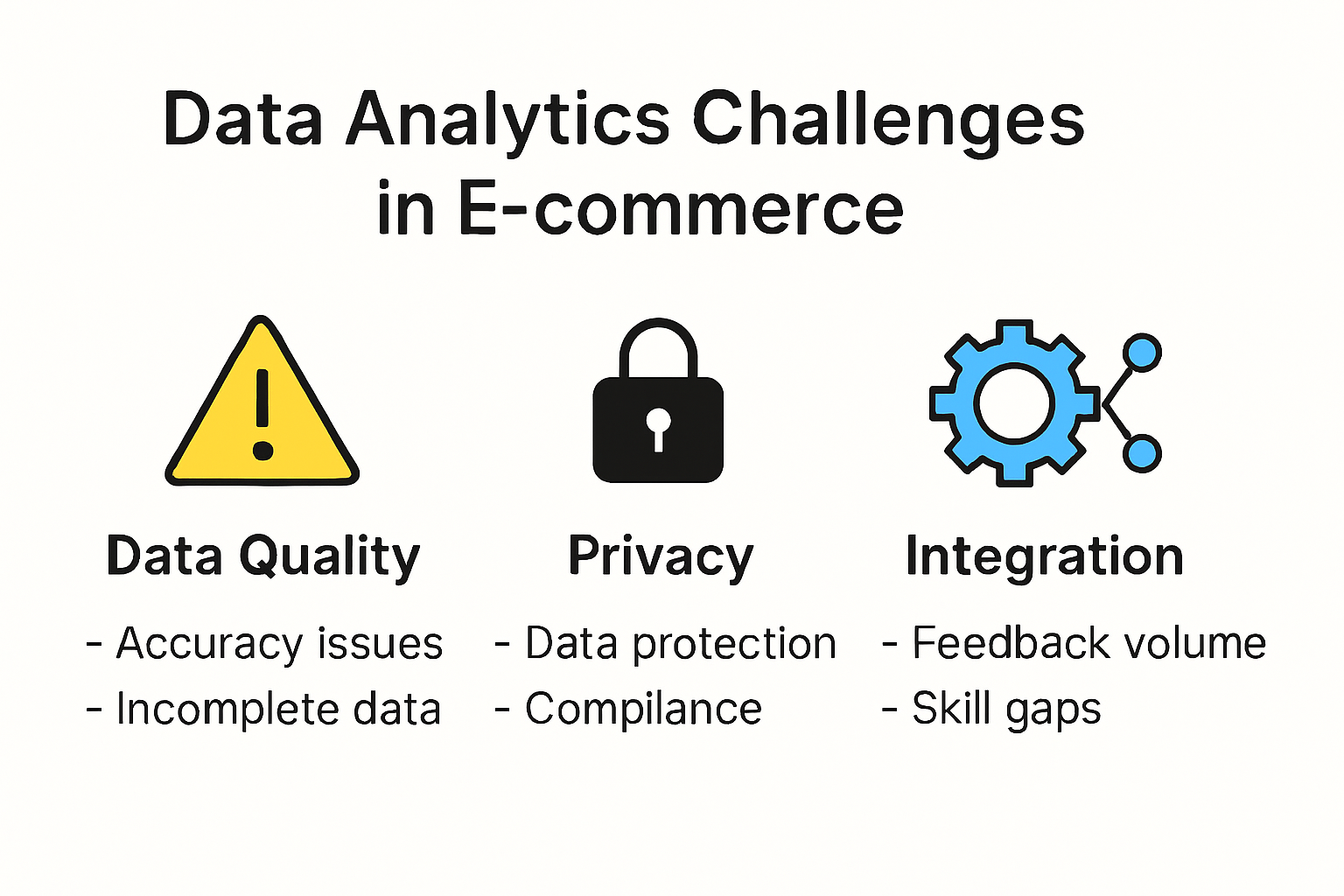E-commerce firms generate mountains of data every second, yet only a fraction of it is ever fully understood or used. Here is a jaw-dropping fact: 64 percent of organisations admit that poor data quality is their top challenge for integrity in 2025. Most assume investing in analytics software will solve the problem instantly. The reality is far more tangled, with privacy leaks, siloed feedback, and missing technical skills all quietly draining profit and trust from digital shops.
Table of Contents
- Common Data Analytics Challenges In E-Commerce
- Overcoming Data Quality And Integration Issues
- Ensuring Privacy And Compliance In Analytics
- Turning Insights Into Higher Conversion Rates
Quick Summary
| Takeaway | Explanation |
|---|---|
| Address Data Privacy and Integration Challenges | E-commerce platforms must prioritise robust data protection mechanisms and develop comprehensive data governance frameworks to mitigate risks associated with privacy and data integration complexities. |
| Invest in Advanced Technologies for Feedback Analysis | Businesses need to leverage machine learning and natural language processing tools to effectively interpret overwhelming volumes of customer feedback, turning them into actionable insights. |
| Resolve Data Silos for Enhanced Collaboration | To improve data quality and integration, organisations should adopt holistic data integration strategies, implementing centralised platforms that facilitate seamless information sharing across departments. |
| Focus on Ethical Data Utilisation | E-commerce businesses should balance analytical ambitions with ethical standards by creating personalised customer experiences while respecting privacy preferences and maintaining transparent data practices. |
| Modernise Technical Infrastructure | Continuous investment in scalable and flexible analytics infrastructure is essential for overcoming legacy system impediments, enabling effective data-driven decision-making processes in the digital marketplace. |
Common Data Analytics Challenges in E-Commerce

Data analytics has become the backbone of successful e-commerce strategies, yet businesses face increasingly complex challenges in extracting meaningful insights. The digital marketplace demands sophisticated approaches to understanding customer behaviour, tracking performance, and making data driven decisions.
Privacy and Data Integration Complexities
E-commerce platforms encounter significant hurdles in managing data privacy and integration. Research reveals that approximately 30% of e-commerce platforms inadvertently disclose personal user information to third parties, creating substantial privacy risks. This challenge extends beyond simple data protection into the realm of sophisticated data management.
Businesses must navigate intricate data ecosystems where information streams from multiple sources. A comprehensive study highlights the complexity of integrating data from diverse systems, each with unique formats and structures. The result is a complex landscape where consistent and accurate data analysis becomes remarkably challenging.
Below is a summary table highlighting key statistics related to e-commerce data analytics challenges as mentioned in this section and throughout the article:
| Challenge Area | Statistic/Fact | Source/Year |
|---|---|---|
| Data Quality as Top Challenge | 64% of organisations cite it as top issue | Precisely, 2025 |
| Privacy Breach (User Info Leakage) | ~30% of e-commerce platforms affected | Arxiv, 2025 |
| Data Silos in Organisations | 51% face departmental silos | Educause, 2025 |
| Quality Challenges in Integration Projects | 50% view data quality as biggest impediment | Master Data, 2025 |
| Technical Skill Gaps | Short supply acknowledged (no % given) | Article narrative |
| Legacy Systems Impeding Transformation | 85% of IT decision makers report impact | ResearchGate, 2025 |
| Tangible Benefits from Privacy Investments | 97% of organisations | ResearchGate, 2025 |
Overwhelming Volume of Customer Feedback

The exponential growth of digital commerce has generated an unprecedented volume of customer interactions and feedback. Academic research demonstrates that businesses struggle to extract meaningful insights from this massive influx of information. Traditional analytics tools often fall short in processing and interpreting such extensive datasets.
Customer feedback represents a critical data source, but its sheer volume can overwhelm standard analysis techniques. E-commerce businesses must invest in advanced machine learning and natural language processing technologies to transform raw feedback into actionable intelligence. This requires sophisticated algorithms capable of understanding context, sentiment, and nuanced customer experiences.
Technical Infrastructure and Skill Gaps
Implementing robust data analytics strategies requires more than sophisticated tools. Organisations frequently encounter significant skill gaps in their technical teams. Professionals capable of bridging advanced analytics, machine learning, and business strategy remain in short supply.
Moreover, the technical infrastructure supporting comprehensive data analytics demands substantial investment. Legacy systems often cannot handle the complexity of modern data streams, creating bottlenecks in analysis and decision making processes. E-commerce businesses must continuously upgrade their technological capabilities to remain competitive in an increasingly data driven marketplace.
Understanding these challenges is the first step towards developing more effective data analytics strategies. By recognising the multifaceted nature of digital commerce data, businesses can begin to construct more intelligent, responsive approaches to gathering and interpreting critical insights.
Overcoming Data Quality and Integration Issues
E-commerce businesses face critical challenges in maintaining data quality and achieving seamless integration across complex digital ecosystems. The ability to transform raw data into reliable, actionable insights requires strategic approaches and advanced technological solutions.
Data Quality Management Strategies
Research from 2025 reveals that 64% of organizations identify data quality as their primary challenge impacting data integrity. This statistic underscores the urgent need for comprehensive data quality management practices that ensure accuracy, consistency, and reliability.
Effective data quality management involves multiple strategic interventions. Businesses must implement robust validation processes, establish clear data governance frameworks, and create systematic approaches to identifying and rectifying data inconsistencies. This requires developing automated data cleansing tools, establishing rigorous data entry protocols, and creating continuous monitoring mechanisms that can detect and address potential data integrity issues in real time.
The following table organises the primary strategies and technologies for improving data quality and integration in e-commerce, as discussed in this section:
| Focus Area | Strategies/Technologies |
|---|---|
| Data Quality Management | Validation processes, automated cleansing, governance frameworks, monitoring |
| Breaking Down Data Silos | Centralised data platforms, unified repositories, API/cloud architectures |
| Integration Solutions | Machine learning for data mapping, real-time sync, adaptive integration |
| Cultural Shifts | Cross-functional collaboration, data-driven decision making, shared commitment |
Addressing Departmental Data Silos
A 2025 organizational survey highlighted that 51% of organizations struggle with data silos across different departments. These silos create significant barriers to effective data integration and comprehensive business intelligence.
To overcome these challenges, organizations must adopt holistic data integration strategies. This involves implementing centralized data platforms that enable seamless information sharing, breaking down traditional departmental barriers, and creating unified data repositories. Advanced integration technologies such as API-driven architectures and cloud-based data warehousing can facilitate more transparent and accessible data ecosystems.
Advanced Integration Technologies
Industry analysis indicates that 50% of organizations report data quality challenges as their primary impediment in integration projects. This underscores the critical importance of adopting sophisticated integration technologies and methodologies.
Modern e-commerce businesses must invest in advanced integration solutions that can handle complex data transformations. This includes leveraging machine learning algorithms for intelligent data mapping, implementing real-time data synchronization technologies, and developing adaptive integration frameworks that can accommodate evolving business requirements.
Successful data integration goes beyond technological solutions. It requires a cultural shift towards data-driven decision making, where cross-functional collaboration and a shared commitment to data quality become organizational priorities. By treating data as a strategic asset and implementing comprehensive integration strategies, e-commerce businesses can transform potential challenges into competitive advantages.
Ensuring Privacy and Compliance in Analytics
As e-commerce platforms increasingly rely on data analytics, privacy and compliance have emerged as critical challenges that demand sophisticated, proactive strategies. The delicate balance between extracting valuable insights and protecting individual user rights has become a paramount concern for businesses operating in the digital marketplace.
Complex Privacy Landscape
Research from 2025 reveals a startling reality: nearly 30% of popular e-commerce platforms inadvertently disclose personal user information to third parties, raising significant privacy concerns. This statistic underscores the critical need for robust privacy protection mechanisms that go beyond mere compliance.
Navigating the intricate privacy landscape requires a multifaceted approach. Businesses must develop comprehensive data governance frameworks that prioritize user consent, data minimisation, and transparent information handling practices. This involves implementing advanced consent management systems, creating clear user communication protocols, and establishing rigorous internal data access controls.
Technical Compliance Challenges
A comprehensive study identified 33 distinct challenges organisations face when implementing technical measures for data privacy compliance. These challenges range from complex technological infrastructure requirements to rapidly evolving regulatory environments.
Effective compliance strategies demand continuous adaptation. E-commerce businesses must invest in flexible technological solutions that can quickly respond to changing regulatory requirements. This includes developing adaptive data processing systems, implementing real-time consent tracking mechanisms, and creating comprehensive audit trails that demonstrate ongoing compliance efforts.
Consumer Trust and Technological Solutions
Recent research highlights growing consumer skepticism towards AI-driven retail applications and their data collection practices. Modern e-commerce platforms must prioritize building and maintaining user trust through transparent, ethical data management approaches.
Advanced privacy-enhancing technologies offer promising solutions. Techniques such as differential privacy, federated learning, and secure multi-party computation enable businesses to extract valuable insights while minimising individual user data exposure. These technologies allow for sophisticated analytics without compromising personal information, representing a critical evolution in data protection strategies.
Building a privacy-centric analytics approach requires more than technological solutions. It demands a fundamental cultural shift within organisations, where data protection becomes a core value rather than a compliance checkbox. By prioritising user privacy, implementing cutting-edge protection technologies, and maintaining transparent communication, e-commerce businesses can transform privacy challenges into opportunities for building deeper customer trust and loyalty.
Turning Insights into Higher Conversion Rates
Navigating the complex landscape of e-commerce analytics requires more than collecting data. Transforming raw information into actionable strategies that drive conversion rates demands sophisticated analytical approaches and strategic implementation.
Strategic Data Interpretation
Research highlights that poor data quality costs organizations an average of $15 million annually, emphasizing the critical importance of precise data analysis. This financial impact underscores why businesses must develop robust mechanisms for interpreting customer behavioural patterns.
Successful conversion rate optimization involves understanding nuanced customer journeys. Businesses need to move beyond surface-level metrics, diving deep into granular data points that reveal genuine customer motivations. This requires advanced segmentation techniques, predictive modelling, and continuous performance tracking that identifies micro-moments influencing purchasing decisions.
To clarify the key steps for turning analytics insights into improved conversion rates, here is a process table based on the article’s advice:
| Step | Description |
|---|---|
| Advanced Data Collection | Gather detailed behavioural and feedback data from diverse digital sources |
| Data Preparation | Cleanse, validate, and segment data for accuracy and relevance |
| Insight Extraction | Apply predictive modelling and advanced analytics for actionable insights |
| Strategy Development | Translate insights into targeted marketing and personalisation strategies |
| Real-Time Implementation | Deploy recommendations and optimisations across channels in real time |
| Ethical Safeguards | Maintain transparency, secure user consent, and ensure ethical data usage |
| Ongoing Optimisation | Continuously monitor, analyse, and refine strategies based on fresh data |
Technical Integration Challenges
Organizational studies reveal that 85% of IT decision-makers believe legacy systems significantly impede digital transformation initiatives. These technical integration hurdles create substantial barriers to implementing sophisticated analytics strategies.
Overcoming these challenges demands a holistic approach to technological modernization. E-commerce platforms must invest in flexible, scalable analytics infrastructure that can seamlessly integrate diverse data sources. This involves adopting cloud-based analytics platforms, implementing advanced API architectures, and creating adaptive data processing systems capable of real-time insights generation.
Ethical Data Utilization
Comprehensive research indicates that 97% of organizations report tangible benefits from strategic data privacy investments. This statistic underscores the importance of balancing analytical ambition with ethical considerations.
Effective conversion rate optimization transcends mere data collection. It requires creating personalized, contextually relevant customer experiences that respect individual privacy preferences. Machine learning algorithms can help develop sophisticated recommendation engines that predict customer needs while maintaining transparent, consent-driven data usage protocols.
The future of e-commerce analytics lies in developing intelligent, adaptive systems that can transform complex data streams into meaningful, actionable insights. By embracing advanced analytical technologies, maintaining rigorous ethical standards, and cultivating a culture of continuous learning, businesses can unlock unprecedented opportunities for growth and customer engagement.
Frequently Asked Questions
What are the main data analytics challenges for e-commerce in 2025?
E-commerce businesses face challenges such as poor data quality, privacy and data integration complexities, overwhelming volumes of customer feedback, and skill gaps in technical teams.
How can e-commerce platforms improve data quality management?
To improve data quality management, e-commerce platforms should implement robust validation processes, clear data governance frameworks, and automated data cleansing tools to ensure accuracy and consistency.
What strategies can help address privacy and compliance challenges in e-commerce?
Organisations should develop comprehensive data governance frameworks, implement advanced consent management systems, and invest in flexible technological solutions to navigate privacy and compliance challenges effectively.
How can e-commerce businesses transform customer feedback into actionable insights?
By leveraging machine learning and natural language processing technologies, e-commerce businesses can analyse large volumes of customer feedback, extracting meaningful insights that can drive strategic decisions and improve customer experiences.
Overcome E-Commerce Data Tracking Challenges With Confidence
If you are struggling with unreliable data, missing conversions, or privacy compliance headaches described in the “Top Data Analytics Challenges for E-Commerce in 2025” article, you are not alone. Many marketers and e-commerce professionals face problems such as inaccurate conversion tracking, overwhelming amounts of customer data, and the ever-present demands of GDPR compliance. As discussed in the article, these issues can drain your profit and erode customer trust if left unsolved.

Take control today with AdPage’s advanced server-side tagging platform built for accuracy, privacy, and actionable results. Enjoy precise consent management, 100 percent conversion monitoring, and seamless integration with platforms such as Shopify and Magento. Make your analytics future-proof and eliminate the data loss that holds your growth back. Visit AdPage now to schedule onboarding and see your conversion rates rise.



.png)
